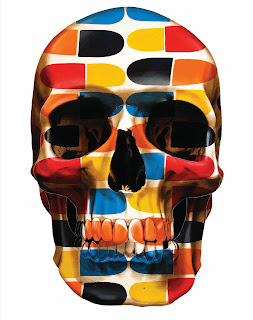I suppose it's a bit like a phantom pregnancy. Not that I've ever had one of those, you understand. But it was
Beirut - An Explosive Thriller that finally tipped a noted London literary agent over the edge into signing me up after 250 rejections for my various works up to that point - Robin took pen to contractual paper early in 2011 and started shopping the book around to publishers at the London Book Fair. His endeavours were, sadly, to bear all too little fruit beyond 14 variations on the word 'no'. It took seven months to collect those 14 negatives. Publishing worketh not at Twitter speed...
I subsequently sent
Olives - A Violent Romance over to Robin but he pointed out, much as he had enjoyed reading it, if he couldn't make a sale with something as commercial as international spy thriller
Beirut, he was never going to do it with a novel like
Olives. This point is fair enough, but what killed me at the time was how long it took to hear back from him with this opinion. It's actually what pushed me into self publishing - not the 14 rejections, but the fact the agent who had signed me took longer to read my book than any of the slushpile submissions I had made in the past.
And now it's happened again. Over ten weeks after I completed
Shemlan - A Deadly Tragedy and sent it to him, he's 'had a chance to read it'. This wasn't a blind submission - this was an agent I was contracted to. I say was contracted, because Robin didn't feel
Shemlan was one for him. And I can see no point whatsoever in being signed up to an agent who doesn't feel he can even
try to sell my work to publishers.
I don't blame him, by the way. I can see agenting can be a thankless old task. I used to get angry at agents and rail at them from the other side of the gatekeeper's cottage. But now I've got to actually meet more of 'em and learn about what they are really driven by. They're doing a job and I can only imagine what it's like constantly having authors battering at you like a malevolent winter hailstorm. Lovely use of simile Alexander. Why thank you. Hardly noticed you'd slipped that in, tell the truth. One tries to be subtle.
So Robin's got a TBR as long as your arm (To Be Read list. Now publishing has discovered the Internet, it's playing with acronyms. How cool are acronyms, eh?) and I understand that. But I just wasted over two months of my life waiting for his verdict and once again realised - as so often in the past, particularly unlocking the little blue door in Sharjah post office to receive another batch of rejections - I was feeling like a Christmas Dog.
Abandoned unloved in the cold, the Christmas Dog chases any passing car in the hope it's the car he got thrown out of on boxing day, the one that led back to the fireplace and the laughing kids feeding him chocolate treats from the tree. I was actually waiting for his response for weeks, opening my Gmail with wide eyes and tongue lolling, panting with dumb canine anticipation. I never actually meant to, you know,
eat the sofa...
I thought I was through with that. I thought I'd gone beyond it. I mean, cripes, I decided to self publish! I promoted the bejabers out of my first self-published novel and loads of people have really enjoyed it. I've got oodles of great reviews, done book clubs and school talks and all sorts as a result of self-publishing
Olives - A Violent Romance. You can see
some of the reviews here or on the book's
Amazon or
Goodreads pages. It stirred up proper old controversy, it was quite the whirlwind. And opening that little blue door at Sharjah post office to lift out royalty cheques rather than rejections is still a major treat for me.
But for all the positive newspaper reviews, website interviews, blog posts, debates around controversies and cascades of delighted feedback from readers,
Olives has sold a total of about two thousand copies. That's it. Two years down the line, I've sold a miniscule number of books. By the same token, I don't regret self publishing at all. I have had so much fun, shared so much pleasure and learned so much, I can't look back with any shred of regret whatsoever. But I also have to confess, the promotion is wearying. Unbelievably so.
Beirut has been promotionally neglected for that very reason - and it shows. It hasn't sold as well as
Olives, despite being a
much more commercial book. Many readers have enjoyed it more than
Olives, finding it a more racy and unputdownable read. Others disagree, which is cool. But the point is,
Beirut is the one an agent thought he could sell - the one where I shelved my own feelings and motivations (and, yes, agenda) and wrote a good old fashioned testosterone-soaked international spy thriller. But it's also the one that I just couldn't be arsed to drive promotionally with the same frenetic energy I ploughed into driving
Olives.
Shemlan - A Deadly Tragedy is a book I am personally very pleased with. I think - and beta readers whose frank and blunt feedback I have come to trust agree - it is my best work. It has some of the strengths of
Olives, IMHO, and some of the strengths of
Beirut. It's darker, in ways faster and yet more nuanced. It's got a hook so hooky you could stick a pirate hat on it and it'd go 'oo aar'. It's not sitting in a desk drawer. No way. If I've learned one thing from this whole self publishing gig, it's that your work is better off out there than in there.
And yet I still want to give it a chance with the backing of a traditional publisher. From Dubai, I can't get out there enough - I don't seem to be able to drive the scale. I'm not a marketing klutz, I know what I'm doing - I mean, it's the day job and everything. Unlike more purist writer friends, I not only don't mind the limelight, I thrive on it. But the conundrum of how you achieve that scale by yourself, especially from a foreign base (and trying to escape the clamorousness of thousands of other authors), has me mildly puzzled and, yes, majorly exhausted. Tens of thousands of followers, countless hundreds of thousands of page views, reviews touching hundreds of thousands of eyeballs and I've sold just a few thousand books.
So no, I don't want an agent who doesn't think he/she has any passion for what I'm up to. But yes, I do want a publisher who thinks they can make something of original fiction set somewhere different and who will put some of the investment into achieving that scale and reach into the UK and US markets. And yet I don't want to spend the rest of the year being Rex The Christmas Dog. It's quite the conundrum, isn't it?
Shemlan - A Deadly Tragedy will publish this year, one way or another. I promise you that. And given the timescales 'traditional' publishing works to, I suspect it will be the other. In the meantime, I'm now looking for another agent.
Footnote: Two other agents have passed and so I must conclude it's not for traditional publishing, so Shemlan - A Deadly Tragedy has gone for editing and will be published, by me as usual, this Autumn.















